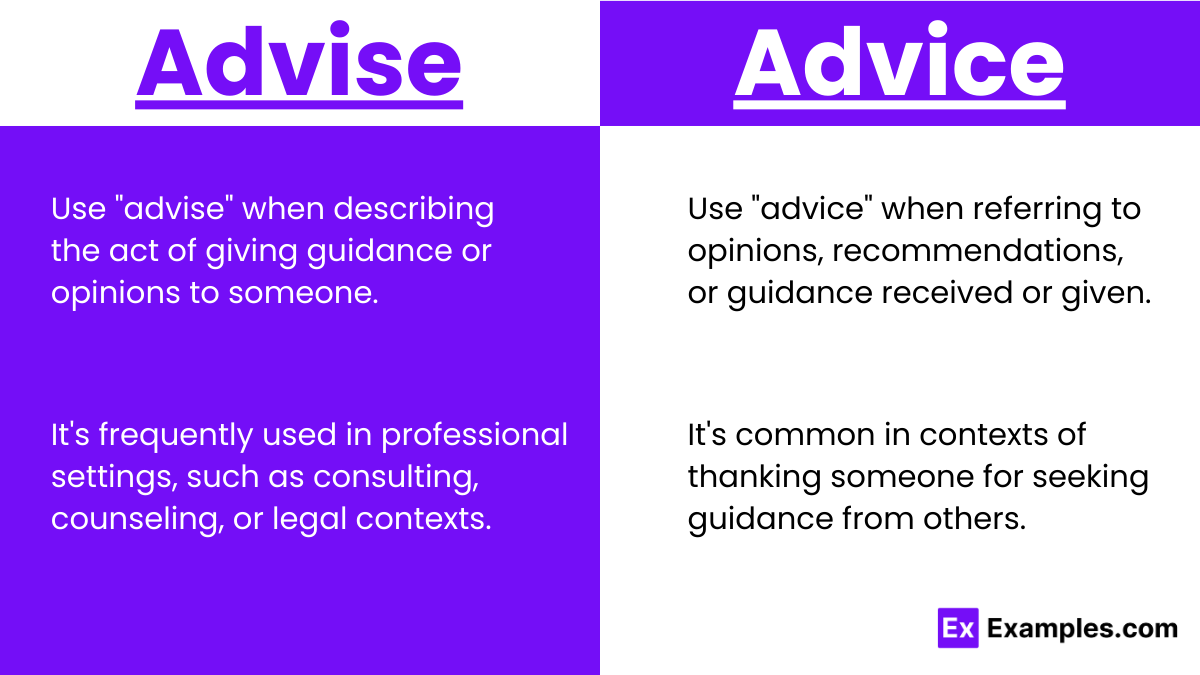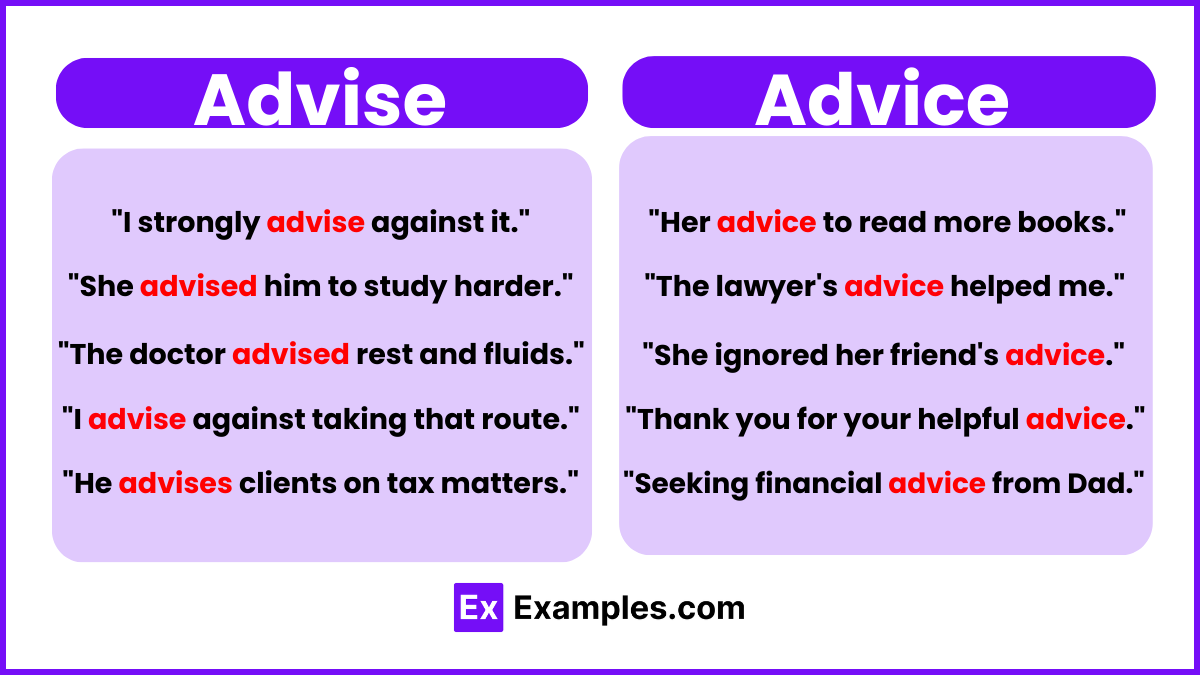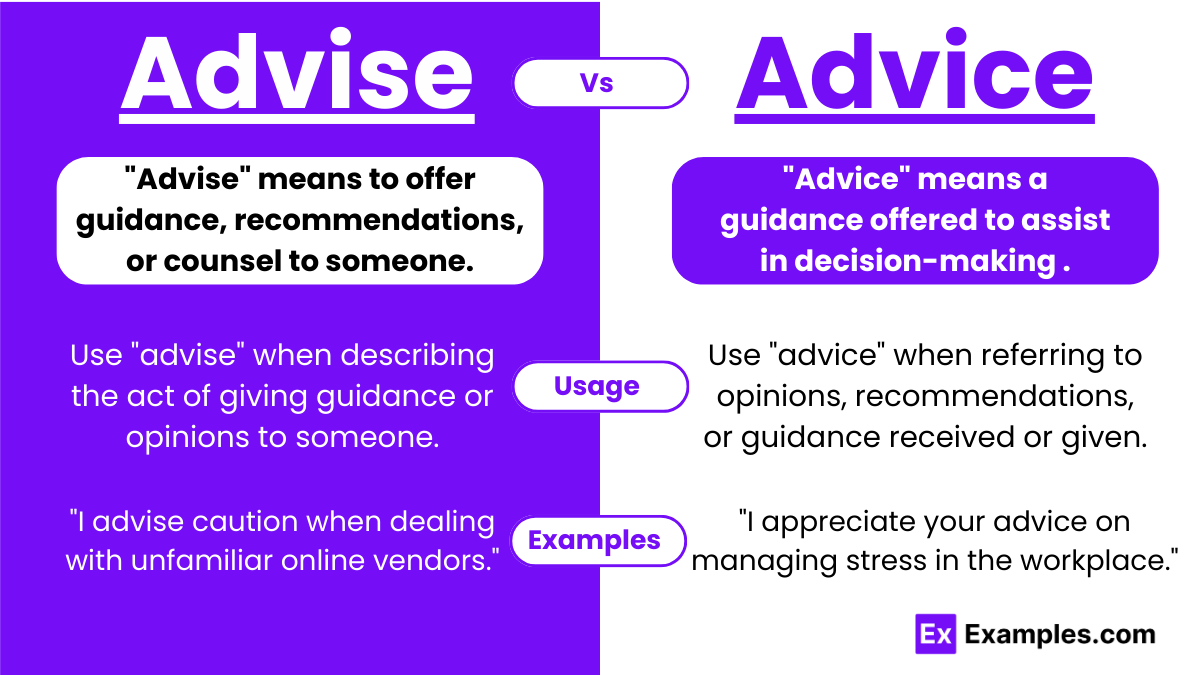Advise vs Advice – Meanings, Differences, Usage, Examples
Understanding the distinction between “advise” and “advice” is crucial for clear communication. Though they sound similar, they serve different roles in a sentence. “Advise” is a verb, indicating the act of giving recommendations or information. On the other hand, “Advice” is a noun, representing the opinions or guidance offered. Remembering this difference ensures effective usage in writing and speech.
Advise vs Advice – Meanings
- Advise: Advise (with an S) is a verb, signifying the act of offering guidance, recommendations, or counsel to someone. It involves providing insights or suggestions to aid in decision-making or problem-solving.
- Advice: Advice (with a C) is a noun referring to the guidance, recommendations, or opinions offered to someone regarding a particular course of action or decision. It encompasses the wisdom or suggestions given to assist others in navigating challenges or making informed choices.
Summary
Advise, as a verb, entails the action of offering guidance or recommendations to others. It involves actively providing counsel or suggestions to aid decision-making processes. Remember the spelling of “advise” by associating it with the action of providing advice. Advice, on the other hand, is a noun denoting the guidance or recommendations given to someone. It encompasses the wisdom or suggestions provided to assist individuals in making informed decisions. To differentiate, recall that “advice” is what you receive or give in the form of recommendations or counsel.
How to Pronounce Advise and Advice
- Advise: Pronounced as /ədˈvaɪz/.
- Advice: Pronounced as /ədˈvaɪs/.
Differences between Advise and Advice
| Aspect | Advise | Advice |
|---|---|---|
| Part of Speech | Verb | Noun |
| Action | Offering guidance or recommendations | Receiving or giving guidance or recommendations |
| Nature | Active | Passive |
| Influence | Provides counsel or suggestions | Receives or gives counsel or suggestions |
| Scope | Pertains to offering guidance | Concerns receiving or giving guidance |
| Use | Involves giving recommendations or counsel | Involves receiving or giving recommendations or counsel |
How to Remember the Difference between Advise and Advice
- Action vs. Information: “Advise” is a verb, indicating action (giving guidance), while “advice” is a noun, representing the information or suggestions given.
- Verb-Ending “ise”: The verb “advise” ends in “ise,” just like other action verbs, such as “exercise” or “realize,” reminding you it’s about giving guidance.
- C in Advice for Counsel: “Advice” starts with the letter “C,” which can serve as a mnemonic for “counsel” or “recommendation,” reinforcing its status as a noun.
- The I in Advise for Instruct: “Advise” contains an “I,” which can remind you of “instruct” or “inform,” highlighting its role as a verb for giving instructions or guidance.
- Use in Sentences: Practice using both words in sentences to reinforce their meanings. For example, “She advised her friend (action) to seek advice (information) from a professional.”
When to Use Advise and Advice

Usage of Advise
- Action-Oriented: Use “advise” when describing the act of giving guidance, recommendations, or opinions to someone.
- Verb Form: Employ “advise” when the sentence requires a verb, such as “I advise you to study diligently for the exam.”
- Subject-Verb Agreement: “Advise” is a verb and must agree with the subject in terms of tense and number.
- Professional Contexts: It’s frequently used in professional settings, such as consulting, counseling, or legal contexts.
Usage of Advice
- Noun Form: Use “advice” when referring to opinions, recommendations, or guidance received or given.
- Informational: Employ “advice” when discussing opinions offered as a guide for action, as in “He always gives good advice.”
- Non-Actionable: Use “advice” when the sentence requires a noun, such as “I appreciate your advice on this matter.”
- Thanking or Seeking: It’s common in contexts of thanking someone for their input or seeking guidance from others.
How to Use Advise and Advice
Advise
- Use “advise” when giving guidance, recommendations, or suggestions to someone.
- It is used to indicate the action of offering counsel or direction.
- “Advise” is typically followed by an object, indicating who is receiving the advice.
- It is conjugated based on tense and subject agreement, such as “advised” for past tense and “advising” for present participle.
- Example: “She advised her colleague to reconsider the job offer.”
Advice
- Use “advice” when referring to the suggestions, recommendations, or opinions given to someone.
- It represents the information or guidance offered.
- “Advice” is often preceded by articles like “a” or “the.”
- It can be both singular and plural, depending on the context.
- Example: “He sought advice from his mentor before making a decision.”
Advise and Advice – Examples

Advise Examples:
- I would advise you to invest in stocks for long-term financial growth.
- She advised him to seek professional help for his health issues.
- The counselor advised the students on career choices and university applications.
- The financial expert advised against making impulsive purchases.
- I advise caution when dealing with unfamiliar online vendors.
Advice Examples:
- Her father’s advice to save money proved invaluable in times of need.
- Seeking advice from experienced professionals can help navigate career challenges.
- I appreciate your advice on managing stress in the workplace.
- His grandmother’s advice to always follow your dreams stayed with him throughout his life.
- The CEO’s advice on leadership strategies transformed the company’s direction.
Synonyms for Advise and Advice
| Advise | Advice |
|---|---|
| Recommend | Recommendation |
| Counsel | Guidance |
| Guide | Tip |
| Direct | Suggestion |
| Instruct | Counsel |
Exercises
- Can you please _______________ me on which route to take to avoid traffic?
- She gave him some valuable _______________ on how to prepare for the job interview.
- I _______________ you to double-check the ingredients before starting to cook.
- Thank you for your _______________ about choosing the right university for my studies.
- The doctor _______________ against consuming too much caffeine late in the day.
Answers
- advise
- advice
- advise
- advice
- advised
FAQ’S
Where to Use Advice and Advise?
Use “advice” as a noun for suggestions or recommendations. Use “advise” as a verb when giving guidance or recommendations to someone.
Can You Please Advise or Advice Me?
“Advise” is the correct verb. Example: “Can you please advise me on which route to take?”
Does a Doctor Advice or Advise?
A doctor “advises.” Example: “The doctor advises patients on healthy lifestyle choices.”
Is It Thank You for Your Advice or Advise?
It’s “Thank you for your advice.” Use “advice” because it’s a noun expressing gratitude for suggestions or recommendations received.
Is It I Need Advice or I Need Advise?
It’s “I need advice.” Use “advice” as a noun to express the need for suggestions or recommendations.


